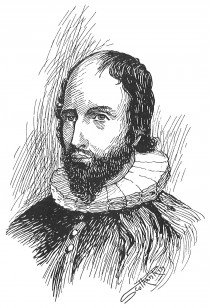
William Guthrie, one of the holiest and ablest of the experimental divines of Scotland, was born at Pitforthy, Angus, the seat of his ancestors, in the year 1620. He was the eldest son of the family, and his superior genius was displayed in his early and successful attention to learning; but till his entrance into college life, he did not obtain that intimate and saving acquaintance with Divine truth which enabled him at once to stay his own soul upon God as the God of his salvation, and to prescribe most skilfully for the cases of spiritual disease that came under his notice. He felt himself greatly indebted for acquaintance with the way of holiness to the instructions of a near kinsman. This was his cousin, James Guthrie, then holding one of the chairs in the New College of St Andrews, and afterwards highly esteemed as the faithful minister of Stirling during the period of the Covenant, for his faithful adherence to which he obtained a martyr’s crown.
Samuel Rutherford, who became Professor of Divinity at St Andrews in 1639, took the guidance of William Guthrie’s theological studies, confirmed and cherished the principles of piety already implanted, and brought him, with his whole soul, to devote himself to the service of Christ. That he might not be entangled in the network of earthly concerns, he resigned his estate at Pitforthy to a younger brother, not engaged at that time in the prosecution of sacred studies. Thus trained in the schools of literature, and rendered familiar with religion both in theory and practice, William Guthrie was well fitted for usefulness as a preacher of the gospel. He was licensed, with the high approbation of the Presbytery, in August 1642.
It was fully two years later that he obtained a church in the newly erected parish of Fenwick; and was ordained minister, in compliance with the harmonious call of the people, in November 1644. Several calls were addressed to him, but ineffectually, to quit his beloved people, till, about a year after his settlement, and very soon after his marriage to an excellent lady of the noble family of Loudon, he left them for a season, by appointment of the General Assembly, to attend the Scottish army as chaplain during the civil war that ended in the execution of Charles I, and the subjection of Scotland to the Protectorate of Cromwell. He was providentially preserved throughout the war, and returned to his flock with increased ardour and devotion. They needed his care; for at the commencement of his ministry, profanation of the Sabbath, desertion of the house of God, neglect of family religion, and gross ignorance, with a train of attendant evils, were prevalent among his parishioners. His talents, natural and acquired, were dexterously applied to check abounding iniquity. The stated calls made by Guthrie at the houses of his people were very acceptable and profitable. The visitation of the sick and the dying, whom he never neglected, the instruction of the young in the doctrine that is according to godliness, and the ministrations of the pulpit, declared him a workman who needed not to be ashamed. As a consistent office-bearer, he duly attended to the government and discipline of the Church, in the session and superior judicatories. He seems to have been a member of the General Assembly of 1649, and stands in the lists of its Commission, along with such illustrious names as James Guthrie, the Marquis of Argyle, David Dickson, James Durham, and Samuel Rutherford.
During the unhappy division of the Church of Scotland into the parties of Resolutioners and Protesters or Remonstrants, the two Guthries, Samuel Rutherford, and several of the most pious and zealous Presbyterians, adhered to the latter. In 1654 Guthrie served as Moderator of the Protestor Synod of Glasgow and Ayr. Ere long he published The Christian’s Great Interest. This work has gone through numerous editions, been translated into various languages, and continues to embalm his memory in the estimation of intelligent Christians of every name. The first edition of it appeared shortly before the Restoration of Charles II.
In the persecution which followed the Restoration, Guthrie was preserved in Fenwick until 1664, through the influence of the Earl of Glencairn, then Chancellor of Scotland, who both respected him as a man of worth, and recollected with gratitude Guthrie’s kindness to him during an imprisonment to which the Earl had been subjected for his loyalty to the King during the sway of Cromwell. He was removed from his pulpit on 24th July of that year. His bodily health, but indifferent before, suffered a severe shock on this occasion; he preached no more in the parish; and about two months later retired to his paternal estate at Pitforthy, now become his possession in consequence of the death of a surviving brother. It was his but for a year of pain and sorrow, caused by a complication of diseases, and by the calamities that were befalling the Church and nation. He was attended during his last illness by visitors belonging to all parties, received kindly but faithfully the Episcopalian clergy who came to converse with him, and died full of faith in the glorious gospel he had preached, with the confident hope of complete redemption. His death occurred on the afternoon of Wednesday, the 10th of October 1665.
[Adapted from the ‘Memoir of the Author’ in the Trust’s Puritan Paperback edition of The Christian’s Great Interest. See also John Howie’s account of William Guthrie in The Scots Worthies (Banner of Truth, 1995).]